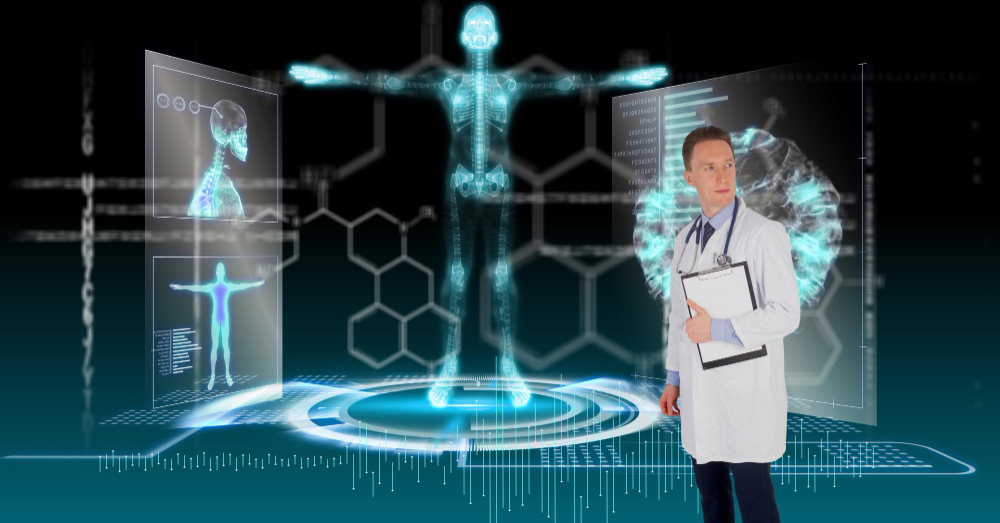Generative AI, a subset of artificial intelligence, is revolutionizing various industries, and healthcare is no exception. By leveraging advanced algorithms, generative AI can create data, images, and even human-like conversations, opening up a plethora of innovative applications within the healthcare sector. In this blog, we’ll explore nine groundbreaking use cases of generative AI in healthcare that are reshaping the landscape of patient care, treatment, and medical research.
1. Creating Synthetic Data for Training Medical AI Models
In the realm of healthcare, data privacy is paramount, making it challenging for researchers and developers to access large, diverse datasets for training AI models. Generative AI offers a solution by generating synthetic data that mirrors real patient information while preserving anonymity. This synthetic data can then be used to train medical AI models for tasks like diagnosing diseases, predicting treatment outcomes, and analyzing medical images.
2. Personalized Treatment Plans through Generative AI
Every patient is unique, and their response to treatments can vary significantly. Generative AI algorithms analyze patient data, including medical history, genetic makeup, and lifestyle factors, to create personalized treatment plans tailored to each individual. These plans take into account various variables to optimize efficacy and minimize side effects, ultimately improving patient outcomes.
3. Drug Discovery and Development
The traditional process of drug discovery and development is time-consuming and costly. Generative AI accelerates this process by simulating molecular structures and predicting their potential efficacy as pharmaceuticals. By generating virtual compounds and predicting their interactions with biological targets, researchers can identify promising drug candidates more efficiently, leading to faster drug development and lower costs.
4. Medical Image Enhancement and Reconstruction
Medical imaging plays a crucial role in diagnosing diseases and guiding treatment decisions. Generative AI techniques, such as image super-resolution and reconstruction, enhance the quality of medical images, allowing for clearer visualization of anatomical structures and abnormalities. This improves diagnostic accuracy and enables more precise surgical planning.
5. Generating Synthetic Patient Data for Clinical Trials
Clinical trials are essential for evaluating the safety and efficacy of new medical treatments. However, recruiting participants and collecting data can be challenging and time-consuming. Generative AI addresses this issue by generating synthetic patient data that closely resembles real-world populations. This synthetic data can help streamline the clinical trial process, reduce costs, and accelerate the development of new therapies.
6. Augmented Reality for Surgical Training
Generative AI combined with augmented reality (AR) technology is revolutionizing surgical training by providing immersive, interactive simulations for medical students and practicing surgeons. These simulations replicate surgical procedures in a realistic virtual environment, allowing trainees to practice complex techniques and refine their skills without risking patient safety. AR-enhanced surgical training improves competency and confidence among medical professionals, leading to better surgical outcomes.
7. Chatbots for Patient Interaction and Support
Patient engagement and support are essential for maintaining overall health and well-being. Generative AI-powered chatbots offer personalized interaction and support to patients, providing information about medical conditions, medication reminders, and lifestyle recommendations. These chatbots can also assist healthcare providers by automating routine tasks, such as appointment scheduling and prescription refills, freeing up time for more meaningful patient interactions.
8. Mental Health Assessment and Therapy
Generative AI is transforming mental healthcare by providing innovative tools for assessment and therapy. AI algorithms analyze speech patterns, facial expressions, and other behavioral cues to detect signs of mental health disorders, enabling early intervention and personalized treatment. Virtual therapists powered by generative AI offer accessible and stigma-free support to individuals struggling with mental health issues, providing counseling and coping strategies in a confidential setting.
Conclusion
Generative AI holds immense potential to revolutionize healthcare by enabling personalized treatment, accelerating medical research, and enhancing patient care. From generating synthetic data for AI training to providing virtual therapy for mental health support, the applications of generative AI in healthcare are diverse and impactful. As the field continues to advance, a collaboration between a generative AI development company will drive innovation and improve outcomes for patients worldwide.


